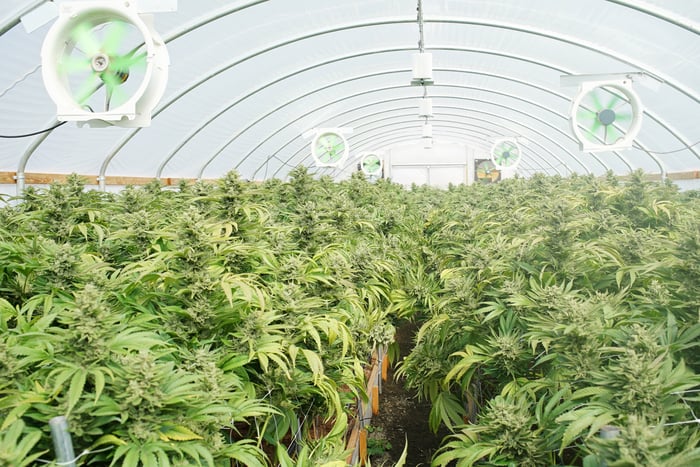If you're an investor looking for rapid and consistent growth, you'd probably struggle to find an industry that's outperforming marijuana at the moment. A report issued last month by Marijuana Business Daily entitled "Marijuana Business Factbook 2017," calls for 30% growth in U.S. legal weed sales in 2017 to a range of $5.1 billion to $6.1 billion, and roughly 300% growth between 2016 and 2021 to more than $17 billion.
Here's why legal cannabis sales are soaring
What's sparking this growth, you ask? Look no further than improving public opinion toward cannabis, the desire of state governments to generate revenue, and "pot-trepreneurs."

Image source: Getty Images.
According to both Gallup's 2016 poll and CBS News' April 2017 poll, a record number of Americans now want to see marijuana legalized nationally (60% for Gallup and 61% for CBS News). Rising favorability has allowed most state-level weed initiatives to pass during election season.
At the same time, legal marijuana sales are opening a new channel of revenue for states in need of additional funding. Colorado, for instance, generated nearly $200 million in tax and licensing revenue in 2016 as its legal pot sales grew by more than 30% to a little over $1.3 billion. The bulk of the gains came from the recreational pot side of the equation. Colorado is using this tax revenue for its education system, as well as to provide extra funding for law enforcement and drug-abuse treatment programs.
And, of course, we can't overlook the fact that pot's rapid growth rate is attracting businesses and investors. Many of the largest marijuana stocks have increased in value by 100% to 300% over the trailing 12-month period.
Weeding out the top marijuana stocks
However, if we could "weed out" the standouts of all marijuana stocks, my vote would go toward Canadian producers for the medical cannabis industry.
The big three producers -- Canopy Growth Corp. (CGC -10.51%), Aphria (NASDAQOTH: APHQF), and Aurora Cannabis (ACB -4.85%) -- have all benefited from growth in Canada's medical user base, and they've all been aggressively expanding their grow capacity. Canopy Growth Corp. has done so through acquisitions by purchasing Mettrum Health and a 472,000 square foot facility that currently houses its headquarters. Meanwhile, Aurora Cannabis is working on a state-of-the-art 800,000 square foot project known as Aurora Sky, and Aphria is undertaking a $100 million Phase IV expansion that'll up its grow capacity to 1 million square feet.

Image source: Getty Images.
These three top producers are also gearing up for what could be a major surge in demand if the Canadian government decides to move forward with a bill to legalize recreational marijuana. The bill, introduced by Prime Minister Justin Trudeau, would legalize adult-use weed by as early as July 2018, and according to government estimates could generate $5 billion to $7 billion in added annual sales. That's massive for the Canadian grow industry.
With the exception of Aurora Cannabis, which is still on track to lose money this year, we've also witnessed a push to profitability among the Canadian growers. Aphria has now reported five consecutive quarters with a profit , while Canopy Growth is on track to turn a profit in its current fiscal year. Though these pot stocks are valued at nosebleed multiples relative to their profits, the simple fact that they are profitable at all allows them to stand out among a sea of unprofitable marijuana stocks.
These changes from Health Canada could mean big trouble for Canadian pot producers
But, these industry standouts could soon come crashing back to Earth in quick fashion.
According to a press release from Health Canada (the regulatory body responsible for overseeing public health in Canada) in late May, big changes are coming to the country's medical cannabis program. Health Canada stated in its press release that the number of eligible patients has increased by about 10% per month to more than 153,000 registered individuals countrywide, and the sale of dried cannabis and cannabis oils have grown by a respective 6% and 16% per month. This means new licensed producers are perceived to be needed to meet growing demand.

Image source: Getty Images.
As of May 24, 2017, there were 44 licensed producers in Canada, and about 4,000 individuals registered with Health Canada to grow a limited amount of at-home medical cannabis. However, there are currently 187 applications at the review stage. This doesn't mean each and every one of these applications is going to be given a green light by Health Canada, but it does suggest the potential for a rapid expansion of licensed producers in the near-term.
Here's how Health Canada is changing the licensing process:
- Increase department review capacity: Health Canada will be allocating more resources to streamline the application review process.
- Undertake certain stages of the review process concurrently: As with the previous point, certain applications will be streamlined through the review process.
- Permits licensed producers to manage their vault capacity: This is key, as it will allow licensed producers to increase their capacity to the maximum of which they can safely and securely store in their vault.
- Authorize longer license periods: New licensed and renewed licenses will now be valid for the maximum length of three years, which means less renewal and approval paperwork.
- Streamline reviews for those with good compliance records: Finally, Health Canada would streamline the process of expanding a production facility for those producers with a good compliance track record.
For Canopy Growth Corp., Aphria, and Aurora Cannabis it means that new competition is set to enter the field, and that supply could, in theory, expand up to vault capacity for these new producers. In other words, it sounds like a recipe for weaker pricing power and lower margins.
Here's another concern to consider
And that's not the only concern for these Canadian weed producers. They also have to be worried about whether or not the Canadian Parliament will pass Trudeau's recreational weed legalization measure. Though support would appear to be there from the public, there have been notable pockets of opposition that could prevent its passage.

Image source: Getty Images.
For example, mayors of select cities have opined that they'll need a portion of tax revenue generated from the sale of adult-use weed to properly regulate and enforce recreational pot laws.
Also, conservatives in Canada's Parliament have brought up two notable concerns with legalization that could be difficult to overcome. For starters, lawmakers worry about how to keep marijuana out of the hands of children. An at-home grow provision, they argue, would make it easy for children to get hold of cannabis. The other issue being that there's no way to accurately test for cannabis impairment while behind the wheel. Without any sort of baseline impairment figure, it's difficult to see how conservatives in Canada's Parliament are going to be satisfied with this legislation.
If Canada doesn't approve Trudeau's bill, then there's a good chance medical patients alone won't be generating enough demand to merit a dramatic surge in license issuances from Health Canada.
Long story short, the successes of Canadian marijuana stocks may soon become a thing of the past.





